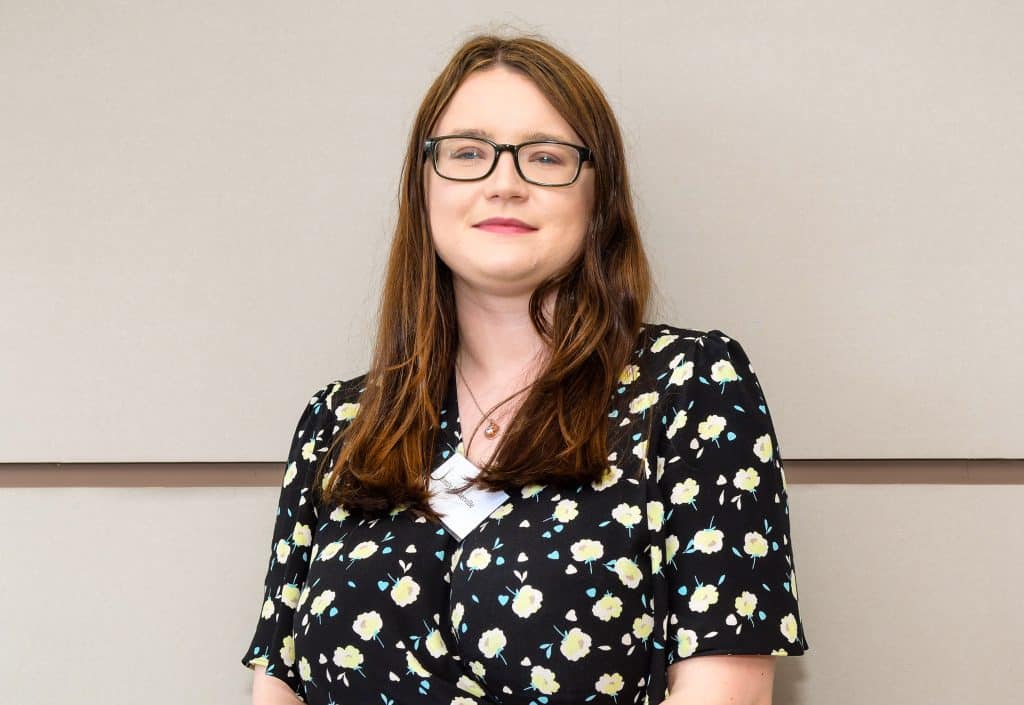Understanding can lead to success for employee and employer
By Jonathan Traynor
For Emily Baskerville, her Asperger’s Syndrome came with so many assumptions and stereotypes from prospective employers that getting a job, and more importantly experience, was a challenge.
However, thanks to an innovative graduate placement scheme by the health and welfare charity, Leonard Cheshire in partnership with the Ulster University Business School, Emily has just completed a placement, as well as workplace training with the university.
The 23-year-old was diagnosed aged 12, but was living as neurodiverse since birth. The very term Asperger’s Syndrome proved to be a barrier, owing to what perspective some have.
“They think that I am reclusive when I have found myself to be very social in work settings after settling in,” the Belfast woman explained.
“Yes, I have challenges with social interaction, and understanding social standards, though I have gotten better with age.”
Emily is among many other fully qualified people with disabilities across the UK for whom getting a job is almost an insurmountable challenge.
Official statistics show that the employment rate for people with disabilities was just 52.7 per cent as of 2021, compared with 81 per cent for non-disabled people. In Northern Ireland, opportunities seem to be even less favourable for this group as the employment rate for them is far lower at 38 per cent.
Launched by Leonard Cheshire to turn the tide of poor employment outcomes for fully qualified graduates with disabilities, a new placement scheme GradEmployNI is championing the cause.
The first of its kind in Northern Ireland, the project places university leavers with various businesses in paid placements for the duration of four months. It’s being delivered in partnership with Ulster University Business School which provides additional workplace training for the successful applicants.
International charity, Leonard Cheshire is advocating disabled people, including their employment rights globally. Roisin McDermott, manager of the GradEmployNI Programme, said they received a diverse range of applications.
“It is a very positive step forward in boosting the employment rate for graduates with disabilities or health conditions in Northern Ireland, which is currently the lowest in the UK,” she said.
Graduates on the programme were placed with three large IT companies (Civica, Kainos, Expleo Group), four quasi-governmental bodies (Councils, Policing Board and Queens), seven with not-for-profit organisations and six with small businesses.
For Emily that placement has been a stepping-stone.
“My current employers have been great to me, though I and they found that hardly any adjustments had to be made,” she said. “Employers and their HR teams should know that we are diverse in how we cope and think of what can be done.”
Like many neurodiverse people, those with Asperger’s Syndrome can find themselves misunderstood, because of popular media stereotypes. However, simple adjustments and understanding needs makes it easier for the employer to have someone in a job that can achieve exactly what is needed.
Emily had the opportunity to be part of the Women in Business team for the duration of her placement.
“I found it enjoyable,” she said, adding: “From the actual work to the events I have helped at, plus work activities, I could not have asked for a better placement.”
Last year, Leonard Cheshire helped 22,152 people with disabilities to seek employment in the UK, Africa and Asia. With their expertise and experience in the field, their statistics indicate a gloomy picture in terms of employer attitudes towards hiring people with disabilities.
Their figures show one in every five employers says they would be less likely to hire someone with a disability, with almost 70 per cent naming the cost of potential workplace adjustments as a key reason. However, in many cases, those adjustments bear no, or minimal material cost at all.
Lorraine Acheson Managing Director of Belfast based Women in Business NI who hosted Emily, said the programme allowed the organisation to “live up” to their diversity and inclusion values.
She added: “Emily has been a tremendous asset to the company. She has fitted well into the team and works quickly and diligently on all aspects of her job.
“It is incredibly important for companies to support programmes such as the Leonard Cheshire Grad Employ programme, to shine a spotlight on the importance of diversity and inclusion in the workplace and to provide opportunities to graduates with a disability.
It’s a great opportunity for both the company and the graduate and there are other companies who can provide support and encouragement to a first time company.”
For those contemplating the graduate programme Emily has one bit of advice: “Be direct in the type of placement that you want.”
For more information go to https://www.leonardcheshire.org/our-impact/our-uk-work/northern-ireland
Issued by Excalibur Press on behalf of Leonard Cheshire
For more information, please contact Tina Calder, Excalibur Press, 07305354209, [email protected]
Do you need help with your publicity, PR or creating content, strategies and plans for your business?
At Excalibur Press we have a team of publicists as well as over 12 content creators and copywriting in a variety of specialisms writing blogs, product descriptions, landing pages, website content, video, photography and more for clients on a daily basis. Maybe this is just one thing we could help you with – even just to get you started.
If you would like to speak to a publicist or content creator or would like more information about our rates and process just call 07305354209 or email [email protected]
Find out more about Excalibur Press at https://excaliburpress.co.uk

